Note: This short entry will not involve itself in the debate about “who is right?” and “who is wrong?”. Please do not take the descriptive as supportive. This is strictly an analysis.
Shortly after Israel moved into Gaza last October, Bibi announced at a press conference that the conflict would last “one year”.
This stuck in my head for one reason and one reason only: one year on from the middle of October of 2023 meant roughly two or three weeks prior to the US Elections. It’s no secret how powerful the Israeli Lobby is on Capitol Hill, and it’s also not a secret that anyone up for election in the USA that opposes Israel will be fighting an uphill battle. Bibi’s one-year window meant, at least to me, that he would use this leverage to the max to pursue what his inner circle felt was the right approach in dealing with Hamas….and with Hezbollah.
Israel’s campaign in Gaza against Hamas has been a punitive one, without any real definition as to what the victory condition would be. Hamas has been degraded (but not eliminated), Gaza has been leveled to the ground, and many civilians have been killed. The fear from the beginning was that this conflict would escalate into an all-out regional war, something that no one really wanted…but that Israel was willing to risk.
The fear of an all-out regional war resulted in tit-for-tat strikes between Israel and Hezbollah along the Lebanese-Israeli border, something that was contained, and therefore, manageable. Russia and China decided from day one of this conflict that they would have nothing to do with it, recognizing Israel, the West Bank, and the Gaza Strip as within the American Zone of Influence. This meant that Iran could not expect any support from either of those two, should the conflict escalate. More importantly, it also meant that Israel was ceded escalation dominance, thanks to the USA having its back via arms, diplomatic cover, media reporting, and those powerful naval vessels parked off of the coast of the Eastern Mediterranean (and do not discount intelligence passed to the Israelis).
I find myself aligned with what
wrote earlier today:Second, friends and foes alike convinced themselves that the Resistance Axis would go out with guns blazing if they were ever on the brink of defeat, which didn’t happen. While it’s unclear whether Hezbollah wanted to escalate but was literally unable to or if it never seriously countenanced this due to MAD, there’s no question that Iran deliberately made the choice not to. While some might attribute this to its new “moderate”/“reformist” president, that ignores the Supreme Leader and the IRGC’s roles.
They’re the ones responsible for Iran’s relations with the Resistance Axis, not the elected leader, and they’re not subservient to him either. There’s no credible indication that they wanted to escalate but were stopped by the president. Rather, all evidence suggests that the country’s leadership as a whole decided not to risk MAD with Israel by waging a conventional war against it in defense of Hezbollah, thus suggesting that prior rhetoric to this effect was just a bluff.
Building upon this observation, the third point is that Israel’s bombing of the Iranian Consulate in Damascus earlier this year and the Islamic Republic’s retaliation can be seen in hindsight as a game-changer in terms of their assessments of one another’s military capabilities. Although Iran’s response was restrained, Israel felt confident enough that it and its allies could intercept a larger salvo, thus emboldening it to assassinate Hamas’ political chief Ismail Haniyeh in Tehran over the summer.
Many of you will recall that I wrote an essay on the US stage-managed tit-for-tat retaliatory strikes between Israel and Iran:
That second act by Israel, and Iran’s failure to retaliate, indicated to me that Tehran found itself boxed into a corner in which it could not risk escalation, and could not save face either. It was at that point that Israel’s escalation dominance was firmly in place. I went out on a limb at that point, and predicted that Iran would not retaliate:
Both Iran and Hezbollah have acted quite rationally during the entire course of this conflict. Realizing that they would not get support for any escalation on their part, they instead chose to apply just enough pressure on Israel to try and get it to stop its Gaza action.
What both failed to realize is that Israel would use its escalation dominance to hit Hezbollah, and at the most opportune time: the short window before the US Election. It is this final stretch of the campaign that permits Israel the most leeway in pursuing its military objectives. The calculation was made that Israel could escalate its bombing and expand it well into Lebanon and ignore calls for de-escalation.
Israel Turns Its Attention North
In less than two weeks, Israel managed to do the following:
explode pagers used by mid-level Hezbollah officers, injuring many
explode walkie-talkies used by lower rank-and-file Hezbollah only 24 hours after the pager explosion action
assassinate key senior Hezbollah commanders via precise strikes
bomb key Hezbollah missile infrastructure sites
assassinate Hezbollah chief Hassan Nasrallah (along with remaining officers and key IRGC senior officers)
This has been a spectacular set of strikes by Israel, resulting not only in the destruction of Hezbollah’s internal communications systems, but also the decapitation of its entire senior command, effectively paralyzing the paramilitary force.
Who is in charge of Hezbollah now? No one knows.
Do they have a new chain of command in place? No one knows.
What will its remains do? No one knows.
This series of strikes was the result of years and years of intelligence gathering and espionage, facilitated not just by technology, but also by HUMINT in the form of spies, informants, and especially, turncoats.
If Iran tries to contact Hezbollah, who can they call? If they find a number, who on Hezbollah’s side will dare to answer it due to fear of it blowing them up?
This remarkable decapitation has, for now, severed the link between Iran and Hezbollah on the ground. No coordination is possible for the time being, and no overall instruction can be delivered to Hezbollah fighters on the ground in the larger strategic sense. Hezbollah is paralyzed.
This is a major blow not just to Hezbollah, but to the “Axis of Resistance”, and in particular to Iran. There is major pressure on Iran to react, and Tehran has three options at its disposal:
stand down
stay the course
escalate
If it chooses to stand down, it risks an existential blow as it would be interpreted as a “complete and total surrender to Zionism”, effectively undermining the regime and one of its longest-stated objectives: the defeat of the Israeli regime.
Iran has already calculated that it cannot escalate without risking the entry of the USA into the conflict. This means that the safest bet is a continuation of the present strategy, with asymmetric actions to be the rule. Iran needs to mend its reputation as the ‘fiercest opponent of Zionism’, lest it lose influence to other Islamist groupings, especially Sunni Salafists. Sunni Mujahideen in Idlib, Syria are celebrating the assassination of Nasrallah, which makes me concerned as to how this will impact that country in the near future.
From The Financial Times:
A critical question is whether Iran, which has made clear its desire to avoid an all-out conflict with Israel and the US, shows restraint after such a grievous blow against its closest ally. Nasrallah was one of the most influential and consequential leaders in the so-called axis of resistance. But the Islamic regime’s ultimate aim is the republic’s survival, so it may choose to avoid direct confrontation with Israel. There are, however, other militant groups within the axis, including Houthi rebels in Yemen and militias in Iraq and Syria, that could be mobilised to step up attacks on Israel.
For those still unsure as to where the USA stands after last night’s spectacular, here is what US Secretary of Defense Lloyd J. Austin III had to say earlier today:
Lebanon’s civilians are caught in the middle, just like those in Gaza have been for almost a year, and just like those in Southern Israel were on October 7th of 2023. I genuinely feel awful for all of them.
Hezbollah’s decapitation has resulted in a temporary state of paralysis. It has not been entirely knocked out, however. The questions now are as follows:
how severely degraded are Hezbollah’s capabilities?
will a regrouped Hezbollah decide to go all-out against Israel in the near future?
which of the three options mentioned previously will Iran pursue?
There is a possibility that we have just witnessed the Israeli-Hezbollah War that was inevitable to anyone who has paid attention to the region over the past twenty years. I do not think that it is over just yet, though.

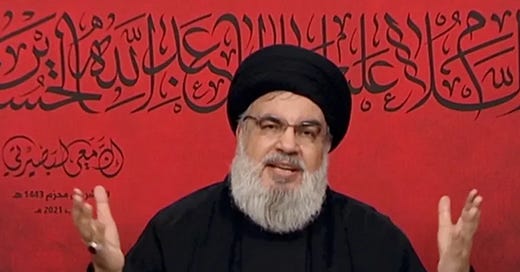



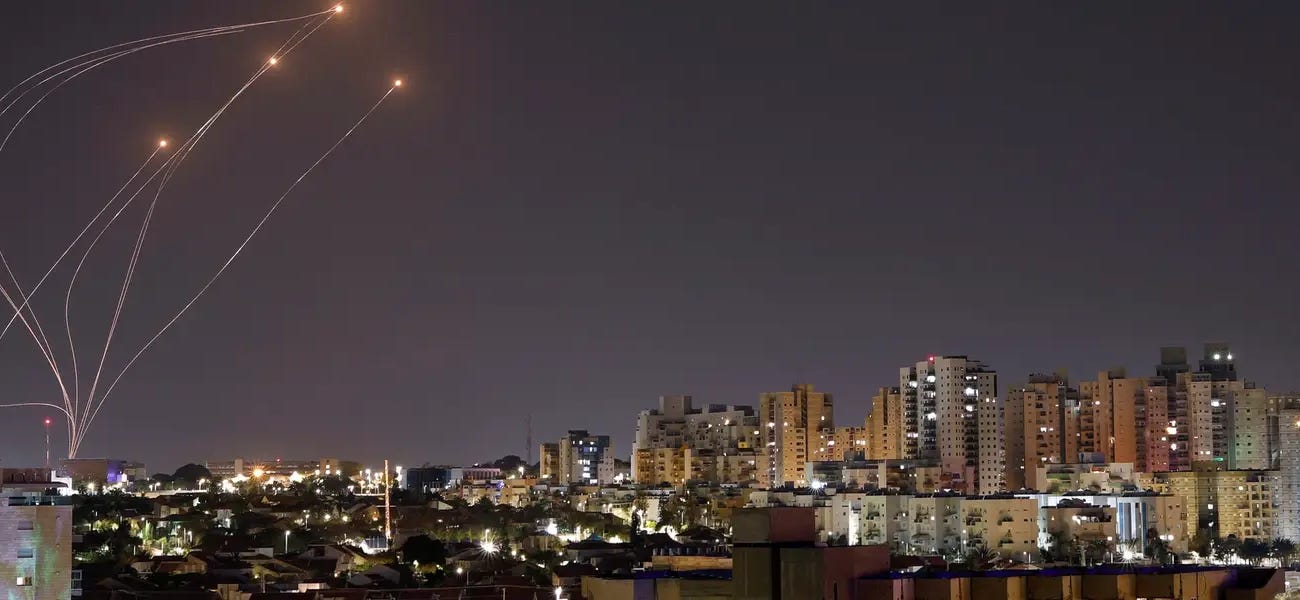
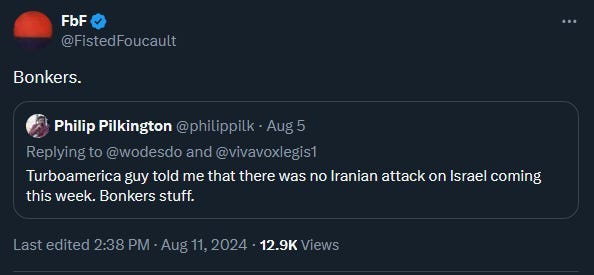
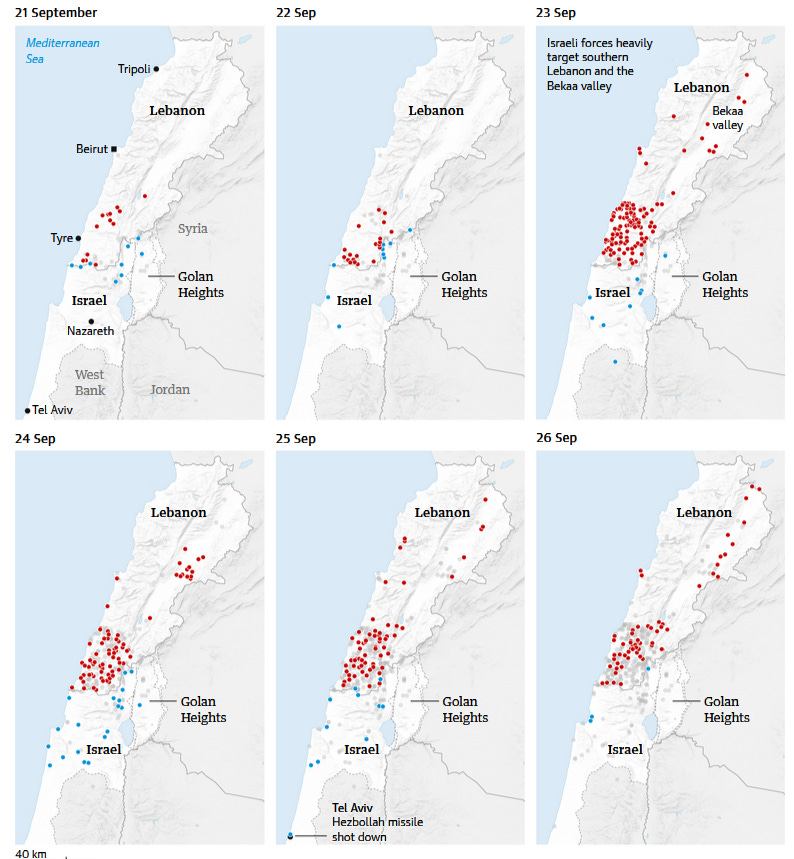
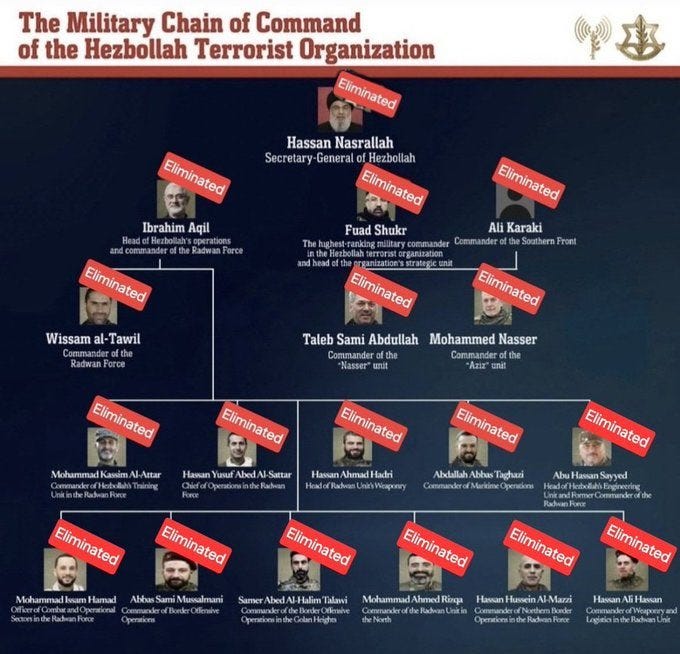
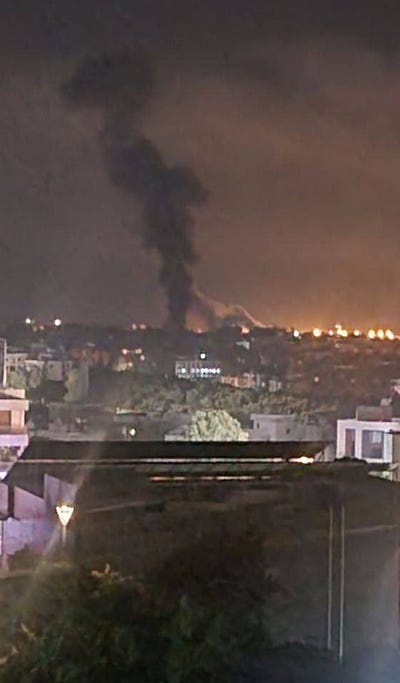
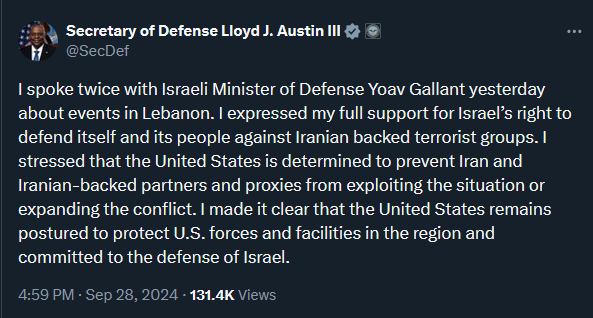
Hit the like button at the top or bottom of this page to like this entry. Use the share and/or re-stack buttons to share this across social media. Leave a comment if the mood strikes you to do so.
And don't forget to subscribe if you haven't done so already.
Maybe Lebanon can return to what it once was - a peaceful, Christian country.
The actual "genocides" in the Middle East have been of Christians and Jews. Don't debate me with feelings, just look at population numbers across many countries over the years.